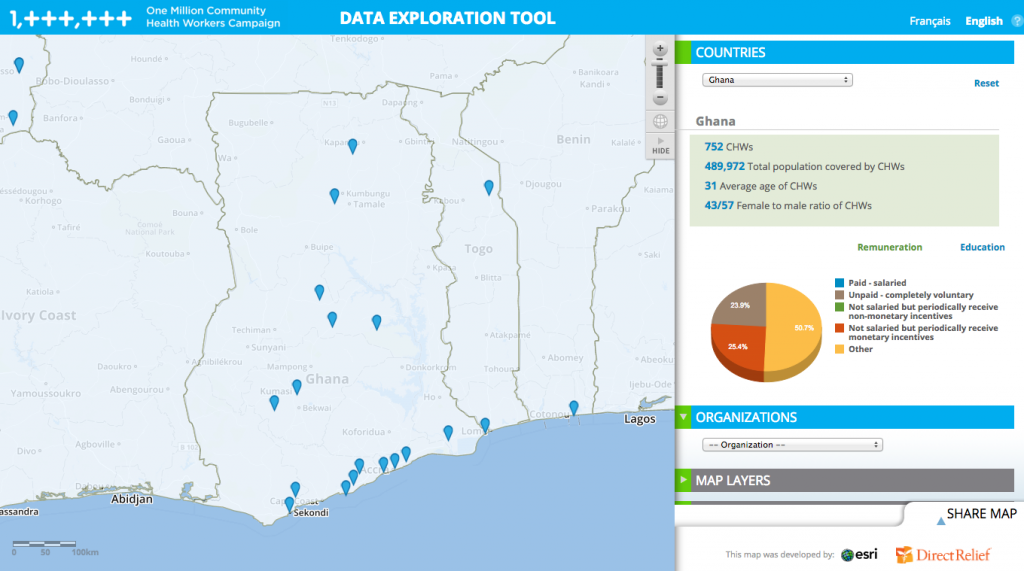Collecting Community Health Worker Data in Ghana

By Sule Kuein, GSK PULSE
Volunteer with the One Million Community Health Workers (1mCHW) Campaign
Ghana Community health workers (CHWs) on the frontlines of care are, without a doubt, one of the most essential building blocks in improving access to essential health services in developing countries and attaining universal health coverage. In Ghana, there are many types of “community-based health workers”, including, but not limited to community health volunteers, community-based surveillance volunteers, community health officers, health extension workers, and field educators. The 1mCHW Campaign is supporting the Government of Ghana to develop an integrated, formalized cadre of CHWs by upgrading the skills of qualified volunteer workers through a national CHW training curriculum.

A snapshot of Ghana’s community health workforce on the Operations Room’s Data Exploration Tool. All data collected via the AddYourCount form! Courtesy One Million Community Health Workers Campaign.
Collecting CHW data is essential to identifying gaps in access to health services. Without access to up-to-date or even real-time data, the precious and selfless work of implementation organizations are performed in isolation where collaboration has the potential to accelerate CHW program scale-up. Increased knowledge about CHWs provides evidence to inform effective collaborative relationships between governments, organizations and relevant agencies Since I started as a GSK PULSE Volunteer with 1mCHW in Ghana, our data collection efforts have focused on collecting data from two main sources
- Data from the Ghana Health Service. The Ghana Health Service has a large cadre of community health officers and community health volunteers in all regions across the country. These frontline health workers go door-to-door, mainly in rural communities, to provide preventative and curative health services as part of Ghana’s Community-based Health Planning and Service Program. Data about these health workers are being collected via offline forms completed at every region, district and community.
- Data from implementation partners and organizations. In Ghana there are many non-governmental organizations that work with their own cadres of health workers, such as HealthKeepers Network, FHI360 and Willows International. Each of these organizations has their own process for collecting and managing data on the CHWs they support. In support of our #AddYourCount campaign, they have graciously submitted an up-to-date summary of their CHW data to the 1mCHW Operations Room
Data on CHWs are entered into the 1mCHW Operations Room via our online #AddYourCount form on the Campaign’s website. This simple form gathers information on CHW locations, population served, education level, average age, female-to-male ratio, remuneration type, training received and services provided, as well as, medical supplies and other equipment provided to CHWs. The form also collects information about the use of mobile technologies, title of CHW supervisors and their meeting frequency with CHWs. All data is reflected in the Operations Room soon after collection and updated regularly.
This valuable information tracking system is not only viable in Ghana, but in all sub-Saharan African countries. Currently, on the Operations Room website, there is information regarding over 140,000 CHWs. With data flowing from both Ghana Health Service and non-governmental organizations, Ghana will soon have a comprehensive map of its community health workers. This will serve as the country’s go-to tool for identifying gaps in human resources for health and underserved areas, as well as enabling all partners to make data-driven decisions toward strengthening Ghana’s health system.
